A Complete 2025 Review of MailChimp. Discover its pros, cons, features, pricing, and if it’s worth it for your email marketing needs.
Thinking About Using MailChimp in 2025? Here’s the Truth
Is MailChimp still a reliable Choice for email marketing in 2025? With so many tools out there, choosing the right one can be overwhelming. pricing to real user feedback you can decide if it’s the right fit for your business.
What is MailChimp?
Mailchimp is an all-in-one marketing platform primarily known for its email marketing. Founded in 2001, it’s now a powerful tool used by millions for managing email campaigns, automations, landing pages, and even social media ads.
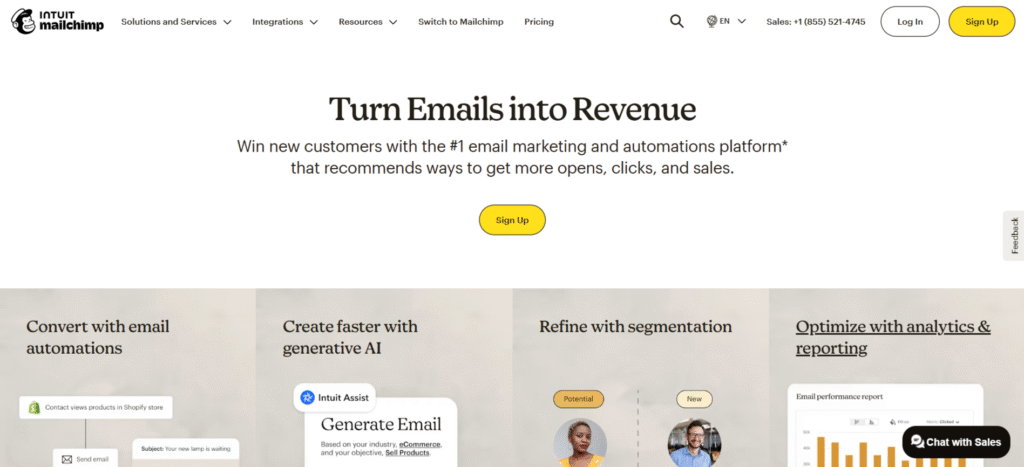
Who is Mailchimp Best Suited For?
Mailchimp is great for:
- Small to medium-sized businesses
- Bloggers and content creators
- E-commerce owners
- Non-technical users
Key Features Reviewed
1. Mailchimp Email Campaign Builder
Mailchimp offers a drag-and-drop email builder with pre-designed templates and personalization options. It’s beginner-friendly and mobile-optimized.
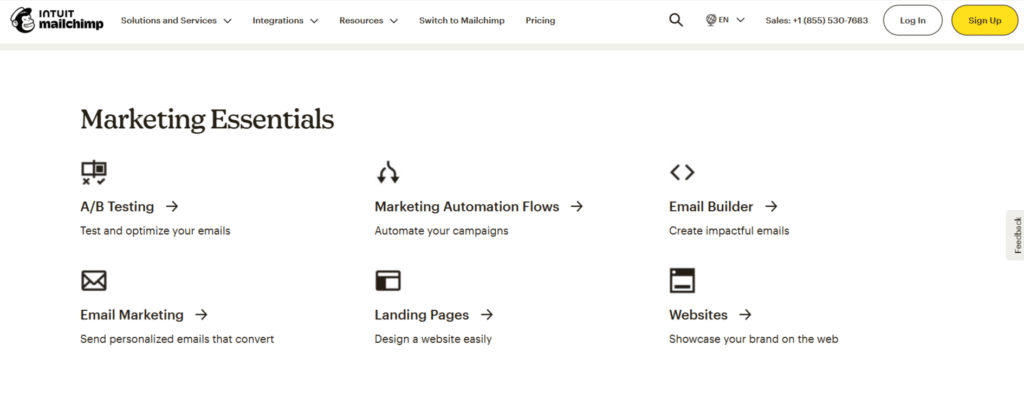
2.Mailchimp Automation Workflows
From welcome emails to cart abandonment and re-engagement flows, Mailchimp supports basic to moderately complex automation workflows.
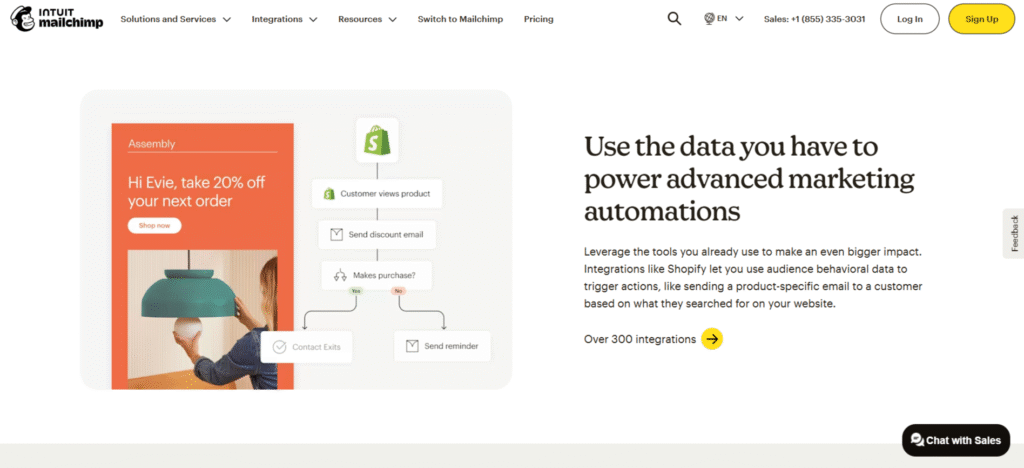
3.Mailchimp Audience Segmentation and CRM
You can tag, segment, and manage your audience with ease. The built-in CRM allows you to track interactions and behaviors.
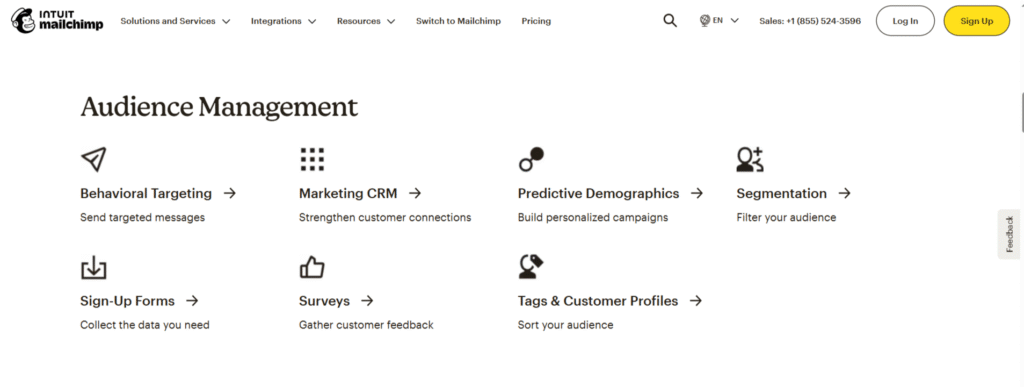
4.Mailchimp Reporting & Analytics
Track opens, clicks, bounces, and more. It also provides comparative reports and AI-based suggestions.
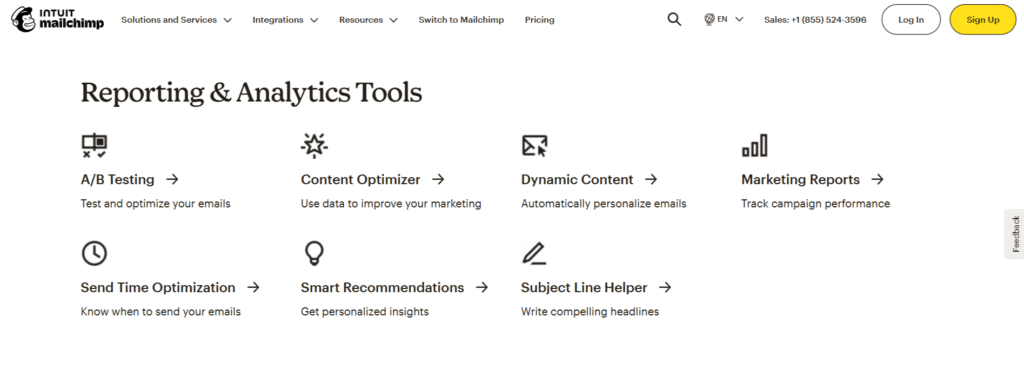
5.Mailchimp AI & Predictive Tools (2025 Update)
New AI-powered tools help predict customer lifetime value, suggest send times, and improve engagement through smart segmentation.
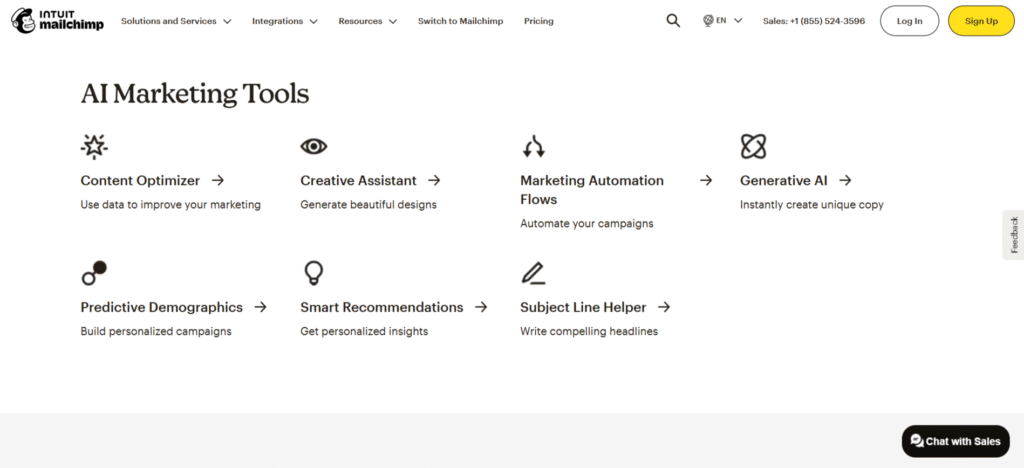
6. Mailchimp Integrations and E-commerce Features
Mailchimp integrates with Shopify, WooCommerce, WordPress, and over 300 apps.
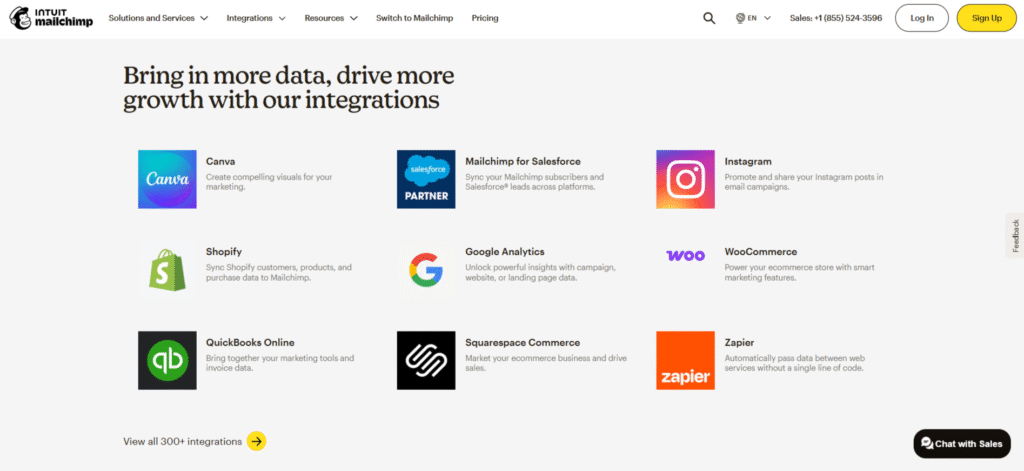
Mailchimp Pricing in 2025
MailChimp offers 4 main pricing tiers, each based on the number of contacts and features you need:
1.Free Plan:
- Price: 0$/month
- includes
- Up to 500 contact
- 1 audience
- Basic email template
- Limited automation
- Basic Reporting
- Best for: Beginners, freelancers, or testing the platform.
2.Essentials Plan
- Starting at: $13/month (for up to 500 contacts)
- Includes
- Email Scheduling
- A/B Testing
- Access to All Email template
- Basic Customer Support
- Best for: Small businesses ready to scale up from the free plan.
3.Standard Plan
- Starting at: $20/month (for up to 500 contacts)
- Includes:
- Automation workflows
- Send time optimization
- Behavioral targeting
- Custom branding
- AI-powered content suggestions
- Best for: Growing businesses wanting better automation and analytics.
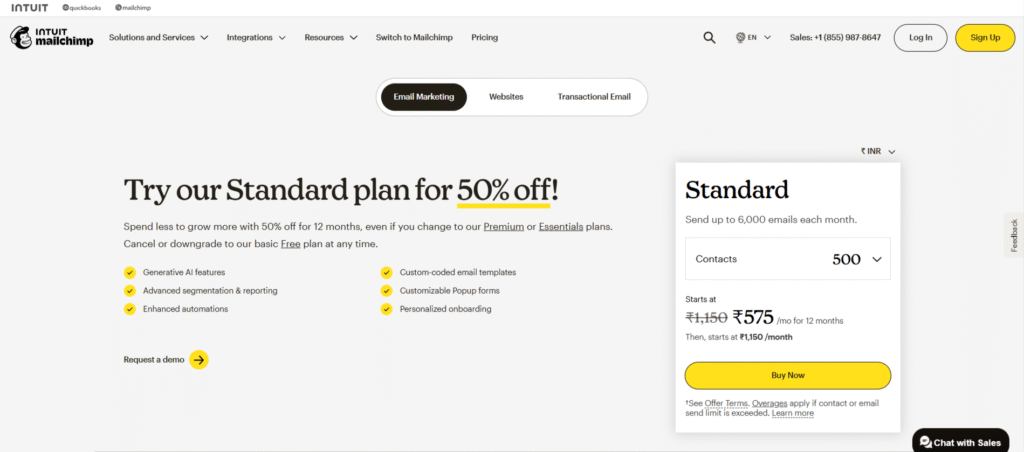
4.Premium Plan
- Starting at: $350/month (for up to 10,000+ contacts)
- Includes:
- Advanced segmentation
- Multivariate testing
- Unlimited audiences
- Priority support
- Best for: Large organizations or teams managing multiple brands.
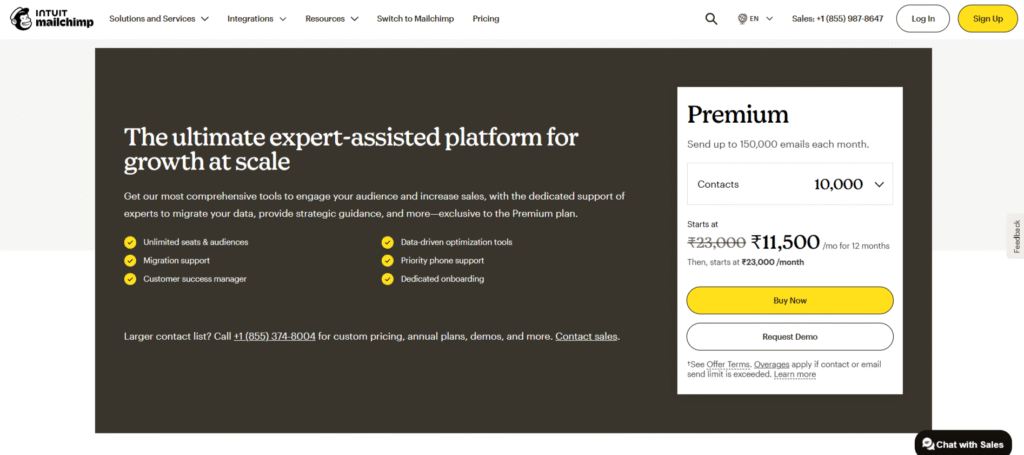
MailChimp Alternative
Here’s a Mailchimp Alternatives Comparison Table (2025) featuring top competitors based on ease of use, pricing, automation, and best use cases:
Check The 10 Best Email Marketing and Automation Tools for 2025. click here
Mailchimp vs Top Alternatives (2025)
| Feature / Tool | Mailchimp | MailerLite | Brevo (Sendinblue) | ConvertKit | GetResponse |
|---|---|---|---|---|---|
| Best For | Beginners & SMBs | Budget-conscious users | Transactional emails & automation | Creators & bloggers | All-in-one marketing |
| Free Plan | Up to 500 contacts | Up to 1,000 contacts | Unlimited contacts (limited sends) | Up to 1,000 subs | Up to 500 contacts |
| Starting Price | $13/mo (Essentials) | $10/mo | $25/mo | $15/mo | $19/mo |
| Ease of Use | ⭐⭐⭐⭐☆ | ⭐⭐⭐⭐☆ | ⭐⭐⭐⭐☆ | ⭐⭐⭐⭐☆ | ⭐⭐⭐⭐ |
| Automation Features | Basic to Moderate | Moderate | Strong | Moderate | Strong (Visual Builder) |
| Email Templates | Many built-in | Clean designs | Good variety | Limited | Rich options |
| A/B Testing | (Standard Plan+) | ✔ | ✔ | Only subject lines | ✔ |
| Transactional Emails | Add-on via Mandrill | ❌ | Built-in | ❌ | ✔ |
| E-commerce Focus | Shopify, WooCommerce | Shopify | Shopify, Magento | ❌ | Shopify, WooCommerce |
| CRM Features | Basic | Basic | Moderate | Basic | Advanced |
| AI Features | Predictive Segments | ❌ | ❌ | ❌ | AI Recommendations |
| Support | Email & Chat (Paid) | Email (Free), Chat (Paid) | Email & Chat | Email only | 24/7 Live Chat (Paid) |
Mailchimp Pros and Cons(2025)
| Pros | Cons |
|---|---|
| Easy-to-use interface, great for beginners | Pricing increases quickly as your contact list grows |
| Generous free plan (up to 500 contacts) | Limited automation in lower-tier plans |
| Pre-built email templates and drag-and-drop editor | Fewer customization options compared to some tools |
| AI tools for content suggestions and segmentation | Advanced features are locked behind expensive plans |
| Strong reporting and analytics | CRM features are basic compared to dedicated tools |
| Integrates with Shopify, WooCommerce, WordPress | No built-in transactional email support |
| Good deliverability rates | Multi-step automations can be clunky for power users |
Mailchimp template and Newsletter
Mailchimp offers a wide range of email templates that are designed to help users build beautiful and effective campaigns — even without design experience.
- Basic Layouts
- Clean, mobile-responsive blocks
- Ideal for text-heavy or simple promotional emails
- Pre-designed Themes
- Professionally styled templates with visuals
- Great for product launches, newsletters, and seasonal emails
- Saved Templates
- Create and reuse your own branded designs
- Helps with consistency in recurring campaigns
- Custom HTML Templates
- For advanced users/developers
- Full control over design and layout
- AI-Generated Templates (Standard Plan+)
- Smart design suggestions based on your brand and content
- Auto-optimized for performance
Mailchimp api
The Mailchimp Marketing API allows developers to integrate Mailchimp’s powerful email marketing features into websites, apps, eCommerce platforms, and backend systems.
| Functionality | API Endpoint | Use Case Example |
|---|---|---|
| Manage Audiences | /lists | Add, update, or delete subscribers |
| Create & send campaigns | /campaigns | Automate email sending from your app |
| Access campaign reports | /reports | Analyze email performance in your dashboard |
| Automate workflows (Journeys API) | /automations | Trigger emails based on user behavior |
| Segment or tag subscribers | /segments, /tags | Personalize content delivery |
| Manage templates | /templates | Pull, create, or edit email templates |
| E-commerce store integration | /ecommerce | Sync store data for abandoned cart emails |
| Webhooks | /webhooks | Receive real-time updates (e.g., new signups) |
| A/B Testing Campaigns | /campaigns/{id}/actions/test | Run subject line split tests via API |
Mailchimp affiliate program
Mailchimp’s program is primarily designed for existing users, especially agencies and freelancers managing client accounts. Rather than cash, rewards are issued as Mailchimp account credit or commission payouts via the Mailchimp & Co Partner Program.
Conclusion: Is Mailchimp Worth It in 2025?
Mailchimp remains one of the most accessible and feature-rich email marketing platforms on the market in 2025. Whether you’re a small business, e-commerce store, startup, or content creator, it offers an intuitive interface, solid automation, and deep analytics — all under one roof.
While its pricing can be a concern for growing contact lists, the value it delivers through audience insights, integrations, and template flexibility justifies the investment for many users.
If you’re just starting out, the free plan is more than enough to test the waters. But as your needs grow, Mailchimp grows with you, making it a reliable long-term marketing partner.
Try Mailchimp’s free plan or compare it with top alternatives
1.How Mailchimp use for e-commerce.
Mailchimp helps e-commerce businesses grow by offering tools for email marketing, automation, and customer insights. You can connect your online store (like Shopify, WooCommerce, or BigCommerce) to Mailchimp and:
1. Recover lost sales with abandoned cart emails.
2. Recommend products using AI-powered suggestions.
3. Send post-purchase follow-ups to build loyalty.
4. Create automated sales funnels for welcome offers, upsells, and repeat purchases.
5. Segment your audience based on purchase behavior (e.g., new vs. returning customers).
6. Track revenue and campaign performance with real-time e-commerce analytics.
Mailchimp turns your customer and product data into actionable campaigns—helping you drive more conversions with less effort.
2. is Mailchimp integrate with Salesforce.
Yes, Mailchimp can integrate with Salesforce, though the quality and functionality depend on whether you use the official native app or a third-party connector.
3. Can I use Mailchimp as CRM?
Yes, you can use Mailchimp as a basic CRM (Customer Relationship Management) system, especially if you’re a small business or just starting out — but with limitations.
4. Is MailChimp good for a startup?
Yes, Mailchimp is a great choice for startups, especially those looking to grow their audience, communicate with leads, and automate marketing without a large budget or team.
5.Does Mailchimp have free e-commerce templates?
Yes. Mailchimp offers several free templates designed for e-commerce use. These are available in the drag-and-drop builder under the “E-commerce” or “Sell Products” categories. You can customize them to match your brand, products, and promotions.
6.is mailchimp is free or paid
Mailchimp offers both free and paid plans, depending on your needs.
7.Which Mailchimp template works best for product launches?
The “New Arrivals Spotlight” or “Product Feature” templates are ideal for product launches. They showcase new products with large images, descriptions, and clear call-to-action buttons to drive traffic and sales.
